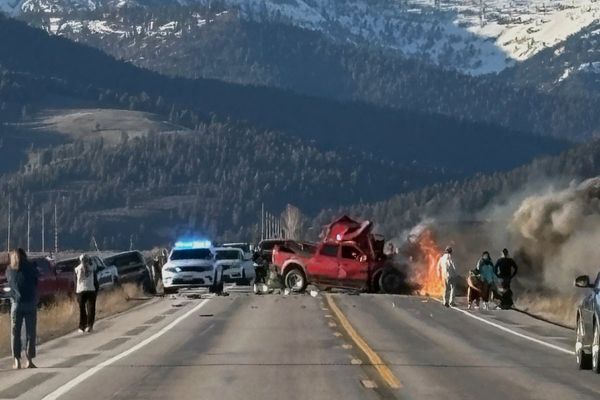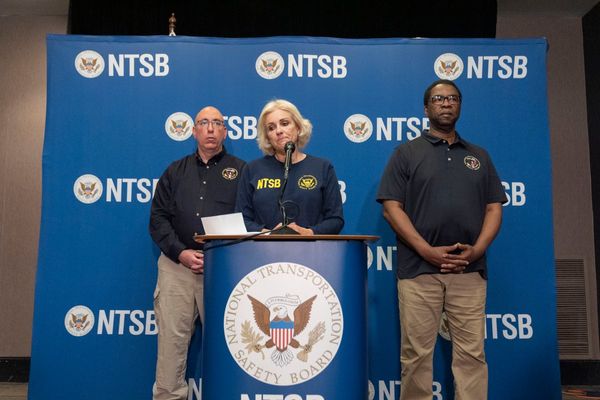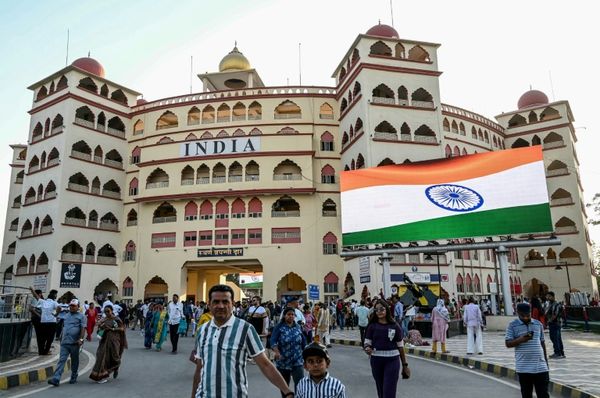
Donald Trump’s threat to impose 100% tariffs on movies made outside the US could wipe out the UK film industry, ministers have been warned, as they came under immediate pressure to prioritise the issue in trade talks with the White House.
UK government officials and senior figures from Britain’s multibillion-pound production industry are to meet imminently to discuss Trump’s threat, which he made after months of promising to restore Hollywood to its “golden age”.
In an extraordinary intervention, Trump announced his intention to impose the levy on all movies “produced in foreign lands”, stating that the US film industry was facing a “very fast death” as a result of incentives being offered overseas. The UK is among the countries offering film-makers generous tax incentives.
The US president said he had already ordered the commerce department and the US trade representative to begin instituting such a tariff. He said on his Truth Social platform the issue was a “national security threat” because of the “concerted effort by other nations” to attract productions.
“Hollywood is being destroyed,” he later told reporters. “Other nations have stolen our movie industry.”
His outburst caused immediate concern in the UK, a regular location for some of Hollywood’s biggest movie productions, including Barbie, parts of the Mission: Impossible franchise and Disney’s Star Wars productions. More big movies are scheduled to be shot in the UK soon, including Star Wars: Starfighter.
Philippa Childs, the head of the creative industries union Bectu, said: “These tariffs, coming after Covid and the recent slowdown, could deal a knockout blow to an industry that is only just recovering, and will be really worrying news for tens of thousands of skilled freelancers who make films in the UK.
“The government must move swiftly to defend this vital sector and support the freelancers who power it, as a matter of essential national economic interest.”
One senior figure in the British creative sector said: “If it becomes real, it will be huge. It could possibly wipe out the British film industry and its crews.”
The international feature film production spend in the UK was £1.9bn last year, with high-end TV production bringing in £2.8bn. Investment from the US on films increased 83% from the previous year.
Adrian Wootton, the chief executive of the British Film Commission, said the announcement was “clearly concerning” but said it was crucial to know more about the details of the plans.
“We will be meeting with government and our industry policy group in the coming days to discuss further,” he said. “The UK and US have long enjoyed a strong, shared history of film-making.”
Senior politicians are calling for Keir Starmer’s government to prioritise the UK film industry in US trade talks, though sources have already told the Guardian that a deal is a second-order priority for Trump.
Caroline Dinenage, the chair of the culture, media and sport committee, said: “Last month the committee warned against complacency on our status as the Hollywood of Europe. President Trump’s announcement has made that warning all too real.
“Making it more difficult to make films in the UK is not in the interest of American businesses. Their investment in facilities and talent in the UK, based on US-owned IP, is showing fantastic returns on both sides of the Atlantic. Ministers must urgently prioritise this as part of the trade negotiations currently under way.”
James Frith, a Labour member of the committee, said any tariffs on UK film production would be self-defeating.
“Any US tariffs on foreign-made films would harm not just British jobs and creativity but also the US studios and audiences who rely on our skilled workforce and production expertise,” he said. “It is in everyone’s interest to protect this deep, highly successful partnership.”
Industry insiders said it was unclear how the tariffs would work in practice, warning they would end up penalising US studios and cutting production and jobs.
Trump is facing resistance in the US from the likes of Gavin Newsom, the governor of California, whose office said the president had no authority to impose such tariffs.
Trump’s declaration was not a complete surprise to industry and government insiders, given his previous declaration that he wanted to help “troubled” Hollywood.
Before his inauguration, he appointed Sylvester Stallone, Mel Gibson and Jon Voight as “special ambassadors” charged with bringing back production lost to “foreign countries”.
Film and television production in Los Angeles has fallen by nearly 40% over the past decade, according to FilmLA, a non-profit that tracks the region’s production.
Trump’s move could also be a reaction to a decision by the China Film Administration in April to “moderately reduce the number of American films imported”, in response to US tariffs on China.
Stephen Galloway, a former editor of the Hollywood Reporter, said: “There is a gigantic problem, which Trump’s social media post addresses, which is that Hollywood has been decimated – there has been a complete flight of production from Los Angeles.
“It’s a locomotive that’s going faster and faster and – based on the expense of living and shooting in Los Angeles, and tax breaks and subsidies from different states and other countries, and the strength of the dollar – that all makes foreign production a bargain. There’s an arms race among states and countries to up the tax breaks and subsidies they offer.”
Galloway suggested Trump may be acting out of a romantic fantasy, much like imagining that under steel tariffs Pittsburgh could once again become a place of US steel production, when in reality there are now about 5,000 steel mill jobs in the area.
“Hollywood is the source of all modern romantic fantasy, but can you restore it to its golden age? No, you can’t,” he said. “Everyone would love to do it, but the invention of the computer chip destroyed Hollywood as we knew it as a film manufacturing hub.
“There’s a contradiction between ‘let’s preserve Hollywood as the centre of manufacturing’ and ‘let’s protect ourselves from foreign propaganda’. But if foreign propaganda is a Disney movie that happened to be shot in Pinewood, what kind of propaganda is that?”
A UK government spokesperson said: “Talks on an economic deal between the US and the UK are ongoing – but we are not going to provide a running commentary on the details of live discussions or set any timelines because it is not in the national interest.
“We will continue to take a calm and steady approach to talks and aim to find a resolution to help ease the pressure on UK businesses and consumers.”
Amid confusion over how any tariff could work in the complicated process of movie-making, a White House spokesperson said no final decision had been made on new levies. They said all options were being explored to deliver on Trump’s concern over Hollywood.







